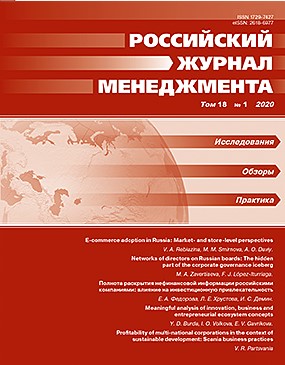Networks of directors on Russian boards: The hidden part of the corporate governance iceberg
DOI:
https://doi.org/10.21638/spbu18.2020.102Abstract
In this paper we apply social network analysis to study the boards of directors of 107 large listed Russian firms between 2009 and 2014. Traditional corporate governance metrics, such as demographic characteristics, experience or multiple directorships, confirm a previously established positive trend towards greater independence and better qualification of the boards of Russian firms. We also find a decrease in the centrality of directors, which corroborates the diminishing concentration of power of some directors. The most connected firms have a specific profile since they are larger, have lower market valuations, and stronger ties with government (both due to higher proportions of government owned shares and a greater number of directors who are former politicians). Our findings also demonstrate that the boards of financial
institutions are less connected, whereas political and independent directors are more centralized.
Keywords:
boards of directors, corporate governance, social networks, Russia
Downloads
References
REFERENCES
Downloads
Published
How to Cite
Issue
Section
License
Articles of the Russian Management Journal are open access distributed under the terms of the License Agreement with Saint Petersburg State University, which permits to the authors unrestricted distribution and self-archiving free of charge.





